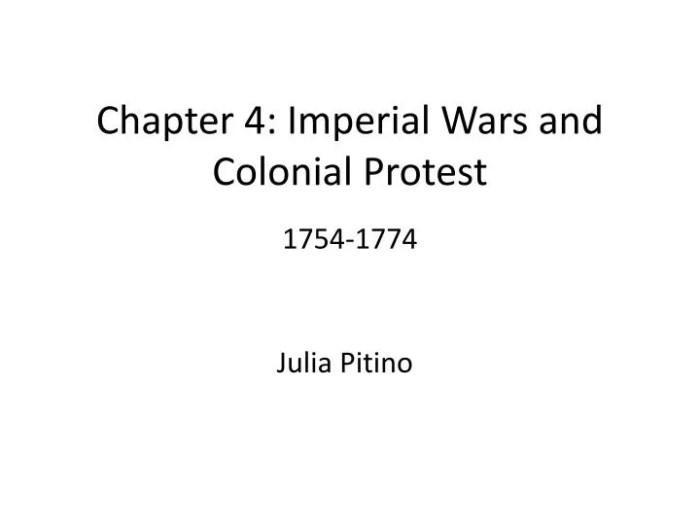Chapter 4 imperial wars and colonial protest – Chapter 4: Imperial Wars and Colonial Protest delves into the intricate interplay between imperial expansion, colonial resistance, and their profound impact on the global stage. This chapter offers a comprehensive exploration of the historical context, motivations, and consequences of imperial wars and colonial protests, providing valuable insights into the complex dynamics that shaped the modern world.
Through detailed case studies, the chapter examines the strategies and tactics employed by both imperial powers and colonial protesters, shedding light on the factors that influenced their actions and outcomes. The role of ideology and nationalism is also examined, highlighting their significance in shaping the motivations and long-term effects of these conflicts.
Imperial Wars and Colonial Protest: Chapter 4 Imperial Wars And Colonial Protest

Imperial wars and colonial protests were significant events that shaped the course of global history. These conflicts and movements were driven by complex factors, including political, economic, and ideological forces.
Imperial wars, fought between European powers and their colonial territories, were motivated by the desire for territorial expansion, economic gain, and political dominance. These wars had a profound impact on colonial societies, leading to the displacement of indigenous populations, the exploitation of natural resources, and the imposition of foreign rule.
Causes and Motivations behind Colonial Protests
Colonial protests were sparked by a range of factors, including dissatisfaction with imperial rule, the desire for independence, and the pursuit of social justice. These protests took various forms, from peaceful demonstrations to violent uprisings.
- Political grievances: Colonial subjects often protested against discriminatory laws, lack of political representation, and the suppression of their cultural and religious practices.
- Economic exploitation: Imperial powers often exploited colonial territories for their natural resources and cheap labor, leading to widespread poverty and inequality.
- Ideological influences: The spread of nationalist and anti-colonial ideas inspired many colonial subjects to challenge imperial rule and seek self-determination.
Case Studies of Imperial Wars and Colonial Protest, Chapter 4 imperial wars and colonial protest
Numerous case studies illustrate the complex dynamics of imperial wars and colonial protests. One notable example is the Indian Rebellion of 1857, which was sparked by British colonial policies and led to widespread unrest across the Indian subcontinent.
Another case study is the Boer Wars in South Africa, which were fought between British imperial forces and the Afrikaner settlers. The wars were motivated by British attempts to control the region’s gold and diamond mines, and resulted in the establishment of the Union of South Africa.
The Role of Ideology and Nationalism
Ideology and nationalism played a significant role in shaping imperial wars and colonial protests. Nationalist sentiments fostered a sense of unity and purpose among colonial subjects, motivating them to resist imperial rule and seek independence.
Ideological influences, such as liberalism and socialism, also shaped the goals and strategies of colonial protesters. Liberal ideas emphasized the importance of individual rights and self-determination, while socialist ideas advocated for social justice and economic equality.
Global Impact of Imperial Wars and Colonial Protest
Imperial wars and colonial protests had a profound impact on global politics and international relations. These conflicts and movements challenged the legitimacy of imperial rule and contributed to the rise of anti-colonial movements worldwide.
The spread of ideas and movements across colonial territories fostered a sense of solidarity and cooperation among oppressed peoples. This global solidarity played a significant role in the eventual decolonization of many parts of the world.
Legacy and Contemporary Relevance
The legacy of imperial wars and colonial protests continues to shape contemporary debates about colonialism, imperialism, and global justice. These events have raised important questions about the ethics of empire, the rights of indigenous peoples, and the pursuit of self-determination.
Lessons from the past can be applied to current conflicts and challenges, such as the ongoing struggle for human rights and social justice in post-colonial societies.
Quick FAQs
What were the primary causes of colonial protests?
Colonial protests were often driven by a combination of factors, including economic exploitation, political oppression, cultural suppression, and the desire for self-determination.
How did imperial wars impact colonial territories?
Imperial wars had devastating consequences for colonial territories, leading to widespread destruction, loss of life, and the disruption of traditional societies and economies.
What role did ideology and nationalism play in shaping imperial wars and colonial protests?
Ideology and nationalism provided powerful motivations for both imperial powers and colonial protesters, influencing their actions and shaping the long-term outcomes of these conflicts.
